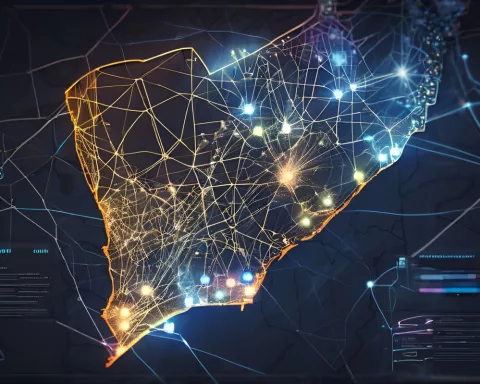Africa is a continent full of untapped potential, with a spirit of innovation and optimism that was showcased at the Global Entrepreneurship Congress Africa. Deputy President Shipokosa Paulus Mashatile emphasized the importance of cultivating an environment conducive to entrepreneurship, preparing Africa for the digital future, and addressing the issue of ‘brain-drain.’ He encapsulated a vision of an innovative and digitally ready Africa that actively shapes its future, with collaboration, effective policies, and support for entrepreneurship being crucial. Overall, the congress stands as a beacon of hope for a brighter future in Africa.
Africa, the birthplace of civilization, is a continent teeming with untapped potential, optimism, and an innovative spirit. The Global Entrepreneurship Congress Africa serves as a testament to this spirit, bringing together entrepreneurs, investors, policymakers, and researchers to identify and develop strategies to drive Africa’s economic growth. Deputy President Shipokosa Paulus Mashatile emphasized the importance of cultivating an environment conducive to entrepreneurship, preparing Africa for the digital future, and addressing the issue of brain-drain. He encapsulated a vision of an innovative and digitally ready Africa that actively shapes its future.
Section 1: The Influence of the Global Entrepreneurship Congress Africa
Africa, the birthplace of civilization, is a continent teeming with untapped potential, optimism, and an innovative spirit. The Global Entrepreneurship Congress Africa, held at the Cape Town International Convention Centre, serves as a testament to this spirit. Deputy President Shipokosa Paulus Mashatile described the congress as an invaluable platform where entrepreneurs, investors, policymakers, researchers, and various individuals come together to identify and develop strategies to drive Africa’s economic growth.
Mashatile reflected on the importance of the event and remembered a defining moment from the 2017 Global Entrepreneurship Congress in Johannesburg. During the previous congress, then Deputy President Cyril Ramaphosa challenged Jonathan Ortmans, who now serves as President of the Global Entrepreneurship Network, to bring the event to Africa. This challenge realized into the Global Entrepreneurship Congress Africa, a pivotal platform for African entrepreneurship that Mashatile esteems.
Section 2: The Importance and Challenges of Africa’s Economic Transformation
In expressing gratitude for the collective efforts of those responsible for the congress, Mashatile reiterated the significance of the event given the current global economic situation. He acknowledged the pressing need for Africa to redefine itself as a more influential player in setting the global agenda. He emphasized the continent’s vast potential, characterizing it as a breeding ground for innovation and invention that is on the cusp of a renaissance.
Despite the optimism, Mashatile also addressed the economic difficulties Africa faces as it navigates towards a more diverse economy. Africa’s role in Global Value Chains is currently secondary, and the continent continues to struggle with structural difficulties rooted in its historical role as an exporter of raw, unprocessed commodities. He underscored the importance of Africa elevating to a position where it has integrated production networks, equal participation in global trade, and a rapidly evolving export mix.
Mashatile also shed light on the role of the African National Congress, the political party he represents. He highlighted their prioritization of using mineral resources for industrialization and regional integration as crucial elements of the economic development plan for South Africa and the continent.
Section 3: The Role of Digital Transformation and Policy Reforms in Africa’s Future
In the increasingly digital world, Mashatile stressed the critical importance of preparing Africa for the digital future. He recommended the implementation of the African Union’s Digital Transformation Agenda, which was approved at its Summit of Heads of State in February 2019. The aim is to ensure that by 2030, every individual, business, and government in Africa is digitally equipped and capable of supporting a thriving digital economy.
He also communicated the need for policymakers to cultivate an environment conducive to entrepreneurship. He highlighted four fundamental areas of focus: establishing the foundations of the digital economy, eliminating bureaucratic obstacles, improving governance systems, and addressing the funding gap for Small and Medium-sized Enterprises (SMEs) and startups.
In this context, Mashatile commended the African Continental Free Trade Area (AfCFTA) agreement, which aims to remove trade barriers in Africa. He expressed optimism that the AfCFTA would significantly enhance intra-African trade, specifically in value-added production and trade across all sectors of Africa’s economy.
Section 4: Addressing the ‘Brain-Drain’ and Realizing a Vision for Africa’s Future
Mashatile also discussed the issue of ‘brain-drain,’ where skilled professionals leave Africa for opportunities in other countries. He proposed making it easier for skills to move across the continent and increasing the number of people who can acquire new skills, particularly in areas vital to the digital economy.
Mashatile’s speech encapsulated a vision of an innovative and digitally ready Africa that actively shapes its future. He emphasized the importance of collaboration, effectively implemented policies, and nurturing an environment that supports entrepreneurship.
The Global Entrepreneurship Congress Africa stands as a testament to Africa’s potential and a call to action for its leaders to establish an environment that paves the way for economic growth, regional integration, and overall prosperity. Above all, it epitomizes Africa’s enduring spirit of innovation and resilience, serving as a beacon of hope for a brighter future.
1. What is the Global Entrepreneurship Congress Africa?
The Global Entrepreneurship Congress Africa is an event that brings together entrepreneurs, investors, policymakers, researchers, and various individuals to identify and develop strategies to drive Africa’s economic growth.
2. What are the challenges Africa faces in terms of economic transformation?
Africa’s role in Global Value Chains is currently secondary, and the continent continues to struggle with structural difficulties rooted in its historical role as an exporter of raw, unprocessed commodities. The continent needs to elevate itself to a position where it has integrated production networks, equal participation in global trade, and a rapidly evolving export mix.
3. What is the African Union’s Digital Transformation Agenda, and how would it benefit Africa?
The African Union’s Digital Transformation Agenda, which was approved at its Summit of Heads of State in February 2019, aims to ensure that by 2030, every individual, business, and government in Africa is digitally equipped and capable of supporting a thriving digital economy. Implementing this agenda would prepare Africa for the digital future.
4. How can policymakers cultivate an environment conducive to entrepreneurship?
Policymakers can cultivate an environment conducive to entrepreneurship by establishing the foundations of the digital economy, eliminating bureaucratic obstacles, improving governance systems, and addressing the funding gap for Small and Medium-sized Enterprises (SMEs) and startups.
5. What is the African Continental Free Trade Area agreement, and how would it benefit Africa?
The African Continental Free Trade Area agreement aims to remove trade barriers in Africa. The agreement would significantly enhance intra-African trade, specifically in value-added production and trade across all sectors of Africa’s economy.
6. What is ‘brain-drain,’ and how can Africa address it?
Brain-drain is when skilled professionals leave Africa for opportunities in other countries. Africa can address this issue by making it easier for skills to move across the continent and increasing the number of people who can acquire new skills, particularly in areas vital to the digital economy.












